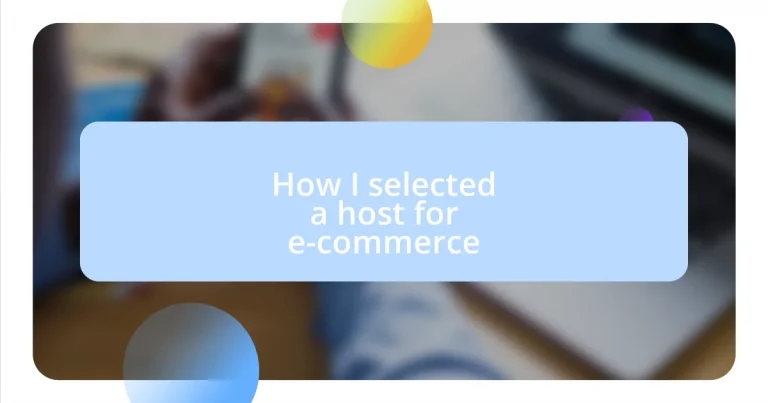Key takeaways:
- Reliability and uptime (99.9% or higher) are critical for e-commerce success, ensuring customers have consistent access to the website.
- Choosing the right hosting type (Shared, VPS, Dedicated) is essential based on business size and growth needs, impacting performance and control.
- Robust customer support and security measures are vital; transparent pricing and features help ensure long-term value for the business.
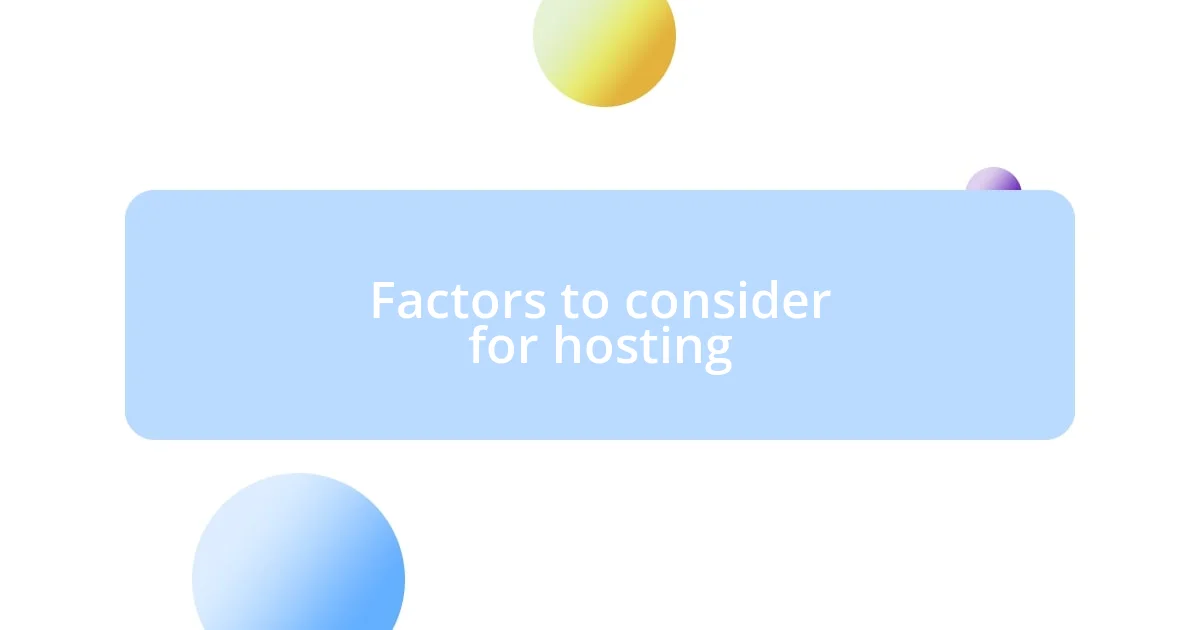
Factors to consider for hosting
When I first started my e-commerce journey, one of the foremost factors I had to consider was reliability. It was nerve-wracking to think about my site going down during a big sale—or worse, losing customers in the process. I remember those sleepless nights worrying about server outages. I came to realize that uptime guarantees, ideally 99.9% or higher, were essential to ensure my customers could always access my store without interruption.
Another crucial component was scalability. I had to ask myself: as my business grows, will my hosting accommodate that growth? Initially, I went for a plan that seemed adequate, but I quickly learned that I needed the flexibility to upgrade seamlessly. It became clear to me that a host that offered easy scalability options was more than just a luxury—it was a necessity for sustained growth.
Lastly, customer support played a significant role in my decision. I vividly recall a late-night panic when I encountered an unexpected issue with my website. Having responsive, knowledgeable support ready to assist me made all the difference. It made me realize that when choosing a host, I needed someone who would be there when I needed them most, ensuring that I could focus on running my business instead of troubleshooting technical problems alone.

Types of hosting options available
There are several hosting options available, each catering to different needs and business sizes. Shared hosting is often the most economical choice for beginners. I remember opting for this when I first launched my online store; it was budget-friendly but came with its limitations, like slower speeds and restricted resources, especially during peak traffic periods.
As my business began to expand, I transitioned to VPS (Virtual Private Server) hosting. This choice provided better performance and more control compared to shared hosting. I found the increased flexibility appealing, as I could customize my resources according to my growing demands. It felt liberating to experience that boost in uptime and speed—not to mention avoiding the dreaded slow-downs that once haunted me.
For larger e-commerce enterprises, dedicated hosting is often the optimal route. While it’s pricier, the benefits are undeniable. Having an entire server dedicated solely to my website meant top-tier performance, enhanced security, and full control over configurations. I often think back to the peace of mind I experienced knowing that my site was supported by powerful hardware, which allowed me to focus on strategic growth rather than worrying about infrastructure limitations.
| Hosting Type | Key Features |
|---|---|
| Shared Hosting | Cost-effective, suitable for beginners, but shared resources can impact performance. |
| VPS Hosting | Better performance, more control, and scalable resources essential for growing businesses. |
| Dedicated Hosting | Full server control, exceptional reliability, and top-tier performance for larger enterprises. |
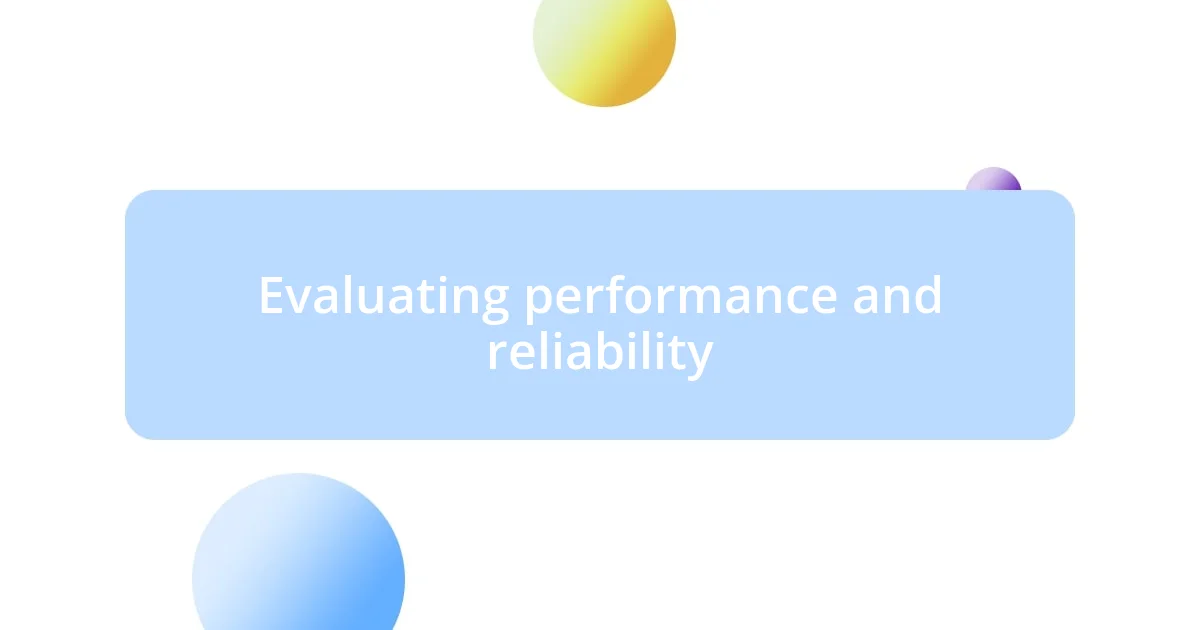
Evaluating performance and reliability
When evaluating performance and reliability, I learned the hard way that not all hosting providers are created equal. During a particularly high-traffic sale event, my website faced an unexpected slowdown, which resulted in frustrated customers abandoning their carts. That experience highlighted how crucial it is to choose a host that not only promises performance but also can back it up with proven reliability. I realized that reading user reviews and checking performance metrics can reveal a lot about a host’s actual capabilities.
Here are some key aspects to focus on:
- Uptime History: Look for hosts with at least a 99.9% uptime guarantee, as consistent access is non-negotiable.
- Load Time: Fast-loading pages improve user experience and can significantly impact sales. Aim for hosts that provide solid speed metrics.
- Scalability: Ensure your host supports quick upgrades or downgrades without major hassle, responding to traffic spikes effectively.
- Consistent Backups: A reliable hosting service should have automated backups, so your data remains safe, even if issues arise.
- Performance Reviews: User testimonials and performance tests can often reveal potential red flags before they become costly problems.
Reflecting on my own journey, I came to value hosts that were transparent about their performance metrics, empowering me to make informed decisions. Fostering a sense of trust with my hosting provider was an essential step in my e-commerce success, providing the comfort that my business could withstand the ups and downs of online retail.
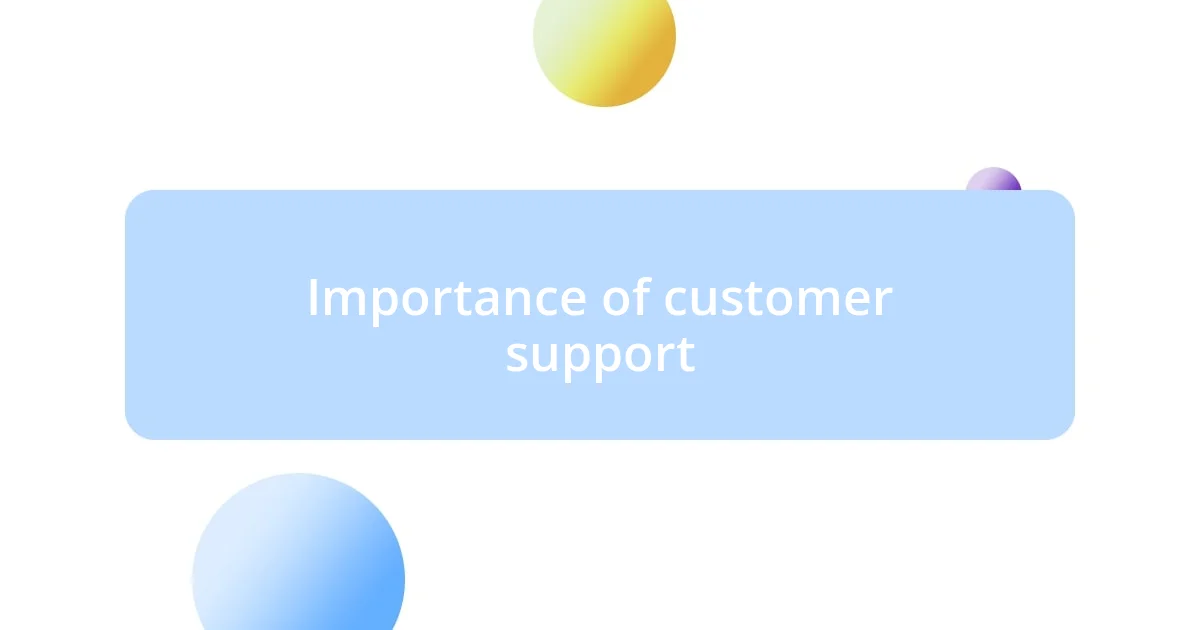
Importance of customer support
Customer support can make or break your experience with a hosting provider, and I’ve definitely had my share of ups and downs in this area. There was an instance when my site unexpectedly went down just before a big promotional event. In that moment of panic, I realized how critical it was to have access to responsive customer support. Thankfully, my host had a live chat feature, and within minutes, I had a technician addressing the issue. That quick resolution not only saved my sale but also reinforced my trust in their service.
Moreover, it’s essential to consider the channels of support offered. I once opted for a provider that only had email support, which felt isolating during urgent situations. When my website faced a technical glitch, hours turned into an eternity. Reflecting on that, I now prioritize hosts that provide multiple support avenues—like phone, live chat, and even social media. The peace of mind that comes with knowing help is easily accessible is worth its weight in gold, especially when timing is crucial for e-commerce.
I also think about long-term relationships with hosting providers. Great customer support isn’t just about being available; it’s about understanding your business needs. I remember sharing my goals for expansion with my host. They proactively offered insights and resources that helped me strategize for growth. This level of engagement made me feel valued and reassured that I wasn’t just another account. I often wonder, how can a business thrive without that kind of support? The truth is, a strong support framework allows not only for resolution of issues but also fosters growth and innovation.

Analyzing pricing and value
Analyzing pricing and value can be a tricky endeavor, especially when determining what you’re getting for your money. I remember encountering a host that promised a bargain rate but hid additional costs within the fine print. This experience taught me that a low sticker price might be tempting, but it’s essential to dig deeper. I often ask myself, is the value worth the price? My answer—always weigh features such as bandwidth, storage, and security against the costs involved before making a decision.
I’ve also come to appreciate hosts that offer transparent pricing structures. During my selection process, I found a provider that not only detailed their services upfront but also offered scalable plans that adjusted with my business growth. It felt reassuring. Another lesson I learned was the importance of evaluating add-ons. For example, while some hosts charged extra for SSL certificates, I found others included them for free. It reminded me of the necessity to look beyond the surface level to truly understand the value of what you’re purchasing.
Additionally, I think about how customer experience ties back to pricing. A few budget hosts I previously considered lacked features that enhanced user experience, like content delivery networks (CDNs) for faster load times. I’ve now realized that investing a little more in a host that provides robust features can lead to higher conversion rates and ultimately, greater revenue. How could I have overlooked that? In my view, choosing a host is not just about the initial price tag; it’s about finding the best value for the long-term health of your e-commerce business.
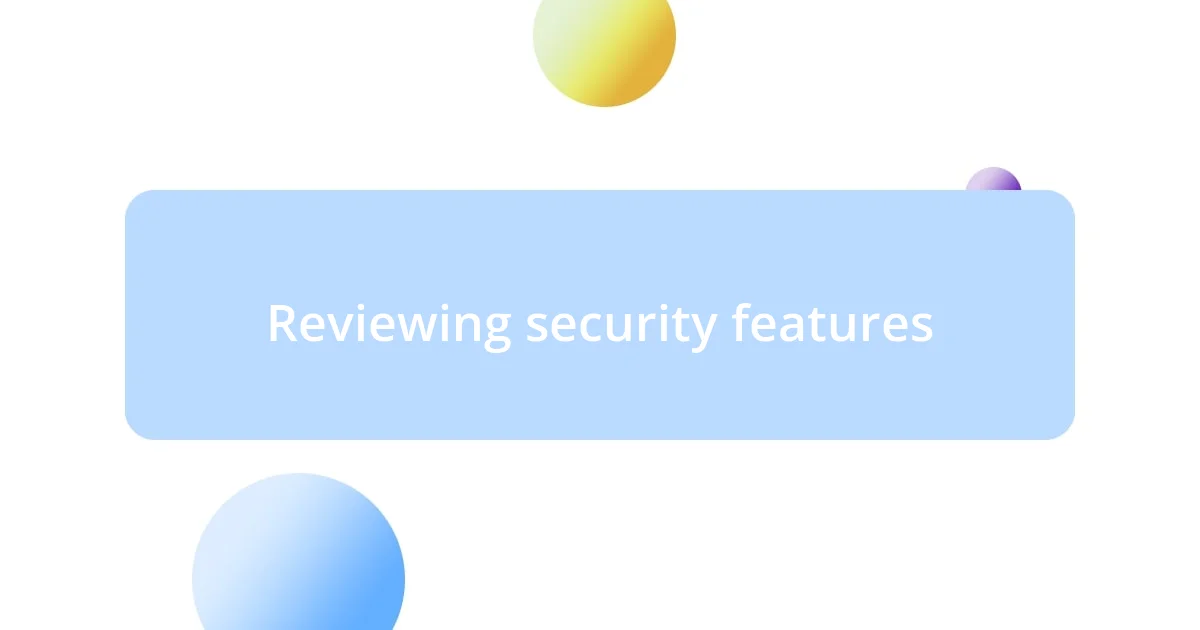
Reviewing security features
When I began evaluating the security features of potential hosting providers, my foremost concern was data protection. I learned the hard way that a breach can jeopardize not just my business but also my customers’ trust. I once chose a host that claimed to provide top-notch security, only to find out that their systems were vulnerable to attacks. So now, I always ensure that the hosting provider offers robust security measures like regular updates, firewall protection, and DDoS mitigation.
One of my biggest eye-openers came during a discussion with a host about SSL certificates. Initially, I didn’t think much of them, viewing them as an extra step rather than a necessity. However, after experiencing an unexpected drop in traffic after failing to secure HTTPS, I realized the importance of end-to-end encryption. It’s fascinating how a simple certificate can not only protect sensitive information but also improve Google rankings. Isn’t it incredible how a site’s trustworthiness can be strengthened with just a few lines of code?
Moreover, I delve into the hosting provider’s response protocols for security incidents. I vividly recall a time when a host offered reassuring promises about their security infrastructure but faltered when a minor issue arose. Watching them scramble was unsettling. Now, I always prioritize hosts with clear incident response plans that outline how they handle breaches and communicate with affected customers. I genuinely believe that a transparent and proactive approach during crisis moments showcases a commitment to not just security, but to their customers’ peace of mind. Isn’t that the kind of provider we all deserve?












